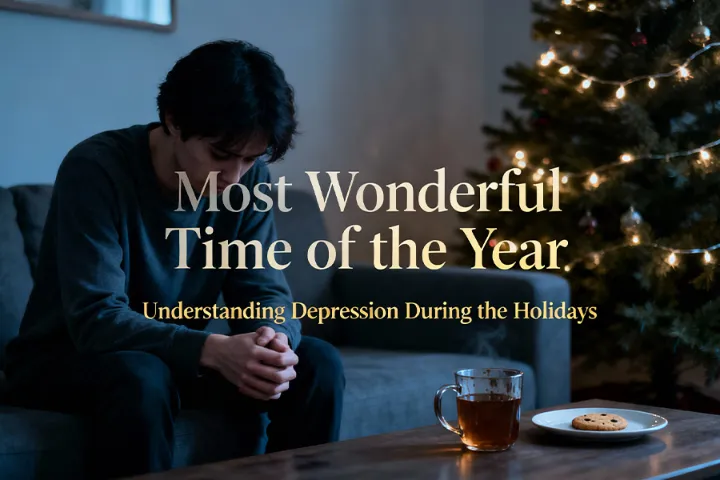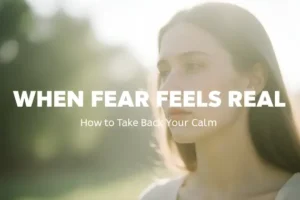Understanding Depression | When the “Most Wonderful Time of the Year” Feels Heavy
As the holidays approach, many people begin to feel an emotional shift that’s difficult to name. On the surface, it’s supposed to be a season defined by warmth, family, celebration, and connection. However, for so many, this time of year can quietly awaken feelings of sadness, pressure, or loneliness that don’t match the glow of the lights or the cheerful music playing in every store. You might find yourself wondering why you’re not feeling what you’re “supposed to” feel — why the gatherings, traditions, or expectations that seem to energize others leave you overwhelmed or drained. It’s in that gap between expectation and reality that depression often grows more noticeable.

The Quiet Pressure of Expectations and Comparison
For some, the holidays amplify old insecurities or self-doubt. It’s easy to fall into subtle comparisons — noticing how other people appear more successful, more stable, more “together” — and suddenly the season becomes a mirror reflecting every fear about not being far enough in life. Family gatherings may stir feelings of being the outsider, the one who doesn’t quite fit the mold. Maybe it’s the tension of holding back parts of yourself — your identity, your beliefs, your boundaries — just to keep the peace. Or perhaps it’s the uncomfortable tug of food anxiety, the pressure of being seen, the sense that your body or habits will be silently assessed. These experiences can leave you feeling exposed in a time that’s meant to feel comforting.
The holidays also tend to bring deeper reflections to the surface. You might catch yourself thinking about how quickly your loved ones are aging or feeling the ache of those who won’t be at the table this year. You may question where you belong, or whether you have enough meaningful connection in your life. These thoughts aren’t flaws — they are your heart’s way of acknowledging its needs. But when they collide with a season saturated in messages of cheer and gratitude, you might feel even more isolated, wondering why joy seems to come so easily to others while you struggle to access it.
When the Darkness Outside Affects the Light Within (A Gentle Look at Seasonal Affective Disorder)
It’s also worth remembering that mood shifts during this time don’t always come from the emotional landscape alone. As daylight decreases and schedules become more hectic, many people experience a change in their energy and motivation. Seasonal affective disorder — a form of depression related to seasonal light changes — can intensify fatigue, sadness, or disconnection. It isn’t about weakness, and it isn’t “all in your head.” The body responds to light, rhythm, and stress, and during the late fall and winter months, those shifts can make an already difficult season feel even heavier.
So, what can you do?
If you’re noticing any of this within yourself, you’re not alone — even if it feels like you are. Holiday depression is far more common than most people talk about. The pressure to feel festive can make your pain feel invisible or invalid, but your feelings are real, and they deserve compassion. You don’t need to force yourself into holiday spirit or pretend you’re fine when you’re carrying so much internally. Sometimes the most loving thing you can do is allow room for your own experience, even when it doesn’t match the mood around you.
- Acknowledge your feelings. It’s okay not to feel “on” or festive. Recognizing and naming your mood doesn’t mean you’re giving in—it means you’re being honest with yourself.
- Set realistic expectations. You don’t have to attend every event, buy every gift, or be “perfect.” Choose what aligns with you, and give yourself permission to decline.
- Stick to the basics: regular sleep, nourishing food, movement—even a short walk. These foundational habits support mood stability especially when stresses rise.
- Have a plan for low moments. Part of understanding depression is thinking ahead: who will you call? Where will you go if you feel overwhelmed? Having that pre-set safety plan helps when things escalate.
- Limit comparisons and social media time. Recognize that what you see is curated. Your life is full of real checking-in moments; the highlight reel isn’t the whole story.
- Lean into genuine connection. Choose one or two people who know you and let yourself be seen. Vulnerability is hard, but it reduces isolation. As one expert suggests: “Talk to a close family member or friend about what you’re going through.”
- Create small traditions that resonate with you. This could be a quiet early-morning walk, a meal you love on your schedule, lighting a candle for someone you miss, writing a note of gratitude or reflection.
- If you’re feeling truly stuck—or signs of worsening depression appear—seek professional help. If you notice persistent hopelessness, a loss of interest, major changes in sleep or appetite, or thoughts of harm, reach out.

 | Finding Support When You Need it Most.
| Finding Support When You Need it Most.
The holidays don’t have to be all joy for them to be meaningful. And your experience, even if it’s complicated or painful, is genuinely part of the human story of this season. If you’re struggling understanding depression, know this: nothing is wrong with you. You are not behind. You are not failing. You are simply carrying emotions that deserve gentleness and understanding. Relief may not come all at once, but you don’t have to walk through this season unseen. There is help, connection, and hope available — and you’re allowed to reach for it.
Even amidst the busyness, help is available at every turn, no matter how intense. Please do not hesitate to call our office at (813) 907-9191or reach out to any of our clinical team. We would be honored to help get you through the holiday season.
Even the Smallest Steps Can Lead to Healing | Therapy for Depression TBCRP




